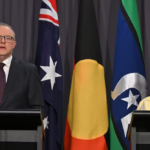Harmony or discord? Thatcher’s heritage
Since her death last week, Margaret Thatcher’s legacy has been discussed on all sides of the political spectrum. As in her lifetime she remains a polarising figure. Dominic O’Sullivan, associate professor at Charles Sturt University, examines her controversial heritage.
Margaret Thatcher began her Prime Ministership with the words of St. Francis of Assisi: “Where there is discord, may we bring harmony. Where there is error, may we bring truth. Where there is doubt, may we bring faith. And where there is despair, may we bring hope.” A stronger metaphor for a legacy marred by division and an aggressively confrontational political style might be the former New Prime Minister David Lange’s remark after a meeting between the two: ‘she addressed me as though I was the Nuremburg Rally’.
Her style was the product of deep political conviction; policy was philosophically grounded, not the outcome of shallow focus group research ‘spun’ into an argument for next week’s public opinion poll in the way that guides contemporary Australian political management. ‘You turn if you want to, the lady’s not for turning’ was a defining response to suggestions of a ‘U-turn’ away from policies of economic liberalisation associated with high unemployment, the privatisation of state assets and the protracted dispute with coal miners whom she described as the ‘enemy within’ for their resistance to mine closures and consequent job losses. The dispute was deeply polarising; Thatcher won, and mining communities across the country were weakened and individual livelihoods lost. While some praise the Thatcher Government for its unwavering commitment to economic rationalisation, others feel the personal consequences in ways that explain the public exuberance, in some quarters, over her death.
Whatever the merits of the arguments, the former Prime Minister brought ‘discord’ not ‘harmony’ to contemporary Britain. The long-term legacy is the contribution she made to shifting the terms of economic debate, such that political parties of both Right and Left, throughout the developed world, broadly accept the liberal economic paradigm. In Thatcher’s time the debate was contested, yet as Tony Blair, the first Labour Prime Minister to follow her has noted, his government maintained many of Thatcher’s economic reforms.
The US President Barack Obama eulogises Thatcher as a ‘great champion of freedom’. This is demonstrably untrue. Certainly, Thatcher contributed to the fall of Communism across Eastern Europe, but her rejection of the economic sanctions that undermined South Africa’s apartheid regime showed that her attitudes to freedom were conditional. Indeed, the present British Prime Minister, David Cameron, has repudiated her description of the African National Congress as a terrorist body and suggested that: ‘The mistakes my party made in the past with respect to relations with the ANC and sanctions on South Africa make it all the more important to listen now’.
Thatcher’s relationship with the former Chilean dictator, Augosto Pinochet, was not simply one of diplomatic courtesy. For Thatcher, Pinochet, who died in 2006, with around 300 unresolved charges against him of human rights violations, tax evasion and embezzlement, and who had led a military coup against an elected government, was a personal friend. Again, there is discord not harmony sown through a relationship remarked upon in this way by the Santiago Times: ‘Thatcher’s staunch support of the dictator — whose 17-year reign of terror included thousands of deaths and numerous human rights abuses — was a controversial position for her to take’.
Controversy, disharmony and despair remain Thatcher’s legacy, whatever the merits of the policy positions she took during her 11 year Prime Ministership. The eulogies since her death last week have come from all over the world and from every political perspective – they are a tribute to the extent of her influence. But, in one way or another, they are extreme, and some even obscene. That is the mark of her shaping of political debate to the antithesis of the hopeful ideals of St Francis of Assisi.

Dominic O’Sullivan is Professor of Political Science at Charles Sturt University and Adjunct Professor in the Centre for Maori Health Research at the University of Auckland University of Technology. His recent publications include ‘We Are All Here to Stay’: citizenship, sovereignty and the UN Declaration on the Rights of Indigenous Peoples and Sharing the Sovereign: Recognition, Treaties and the State.












